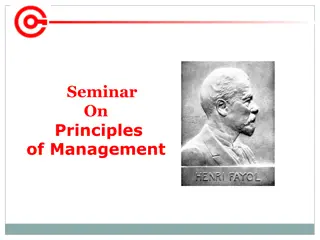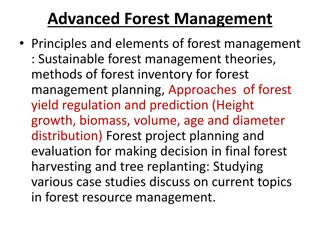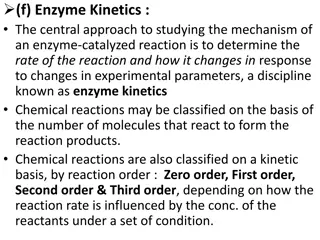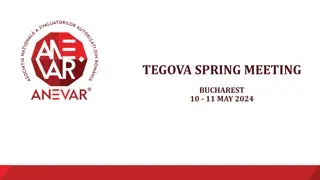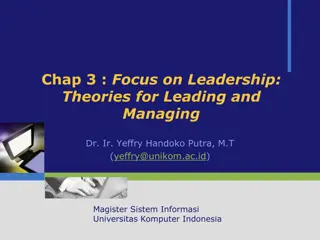Principles of Management: Understanding Henri Fayol's 14 Key Principles
Explore the foundational principles of management through the lens of Henri Fayol's 14 key principles, which offer valuable insights into managerial decision-making and organizational interactions. Delve into the history of Henri Fayol, his contributions to management theory, the concept of authority, and the sources of authority in a managerial context.
Download Presentation

Please find below an Image/Link to download the presentation.
The content on the website is provided AS IS for your information and personal use only. It may not be sold, licensed, or shared on other websites without obtaining consent from the author. Download presentation by click this link. If you encounter any issues during the download, it is possible that the publisher has removed the file from their server.
E N D
Presentation Transcript
ManagementStudyGuide.com Learn Management the Easy Way with the Help of Downloadable Power- point Presentations - Learn at Your Own Pace. The Presentation contains Animation. To View the Course please run the Slide Show . You Can Run the Slide Show by Using any one of the following options: 1. Click on the Slide Show in top menu bar, OR 2. Press the F5 Key Register Now& Download Your Set of6 Free Power-point Presentations with total of more than 1,000 Slides.
Henri Fayols 14 Principles of Management
Course Objectives Introduction Centralization Division of work Scalar Chain Authority Order Discipline Equity Unity of Command Stability of Tenure Personnel Unity of Direction Initiative Subordination of individual interest to general interest Espirit De Corps Remuneration
Principles of Management Management principles are a set of fundamental truths based on logic which provides guidelines for managerial decision making and other actions. These principles are derived: On the basis of observation and analysis i.e. practical experience of managers. By conducting experimental studies
History Henri Fayol Henri Fayol was born in Istanbul in 1841. When he was 19, he began working as an engineer at a large mining company in France. He eventually became the director, at a time when the mining company employed more than 1,000 people. Fayol began to develop what he considered to be the 14 most important principles of management. Essentially, these explained how managers should organize and interact with staff. In 1916, two years before he stepped down as director, he published his "14 Principles of Management" in the book "Administration Industrielle et Generale" . Fayol also created a list of the six primary functions of management, which go hand in hand with the Principles. Fayol's "14 Principles" was one of the earliest theories of management to be created, and remains one of the most comprehensive.
Authority Definition and Meaning The term authority implies the right and power of a person to exercise discretion to make decisions, to issue orders, to use organizational resources and to hire and fire employees. It is the sum of rights and powers entrusted to a person to enable him to perform the assigned tasks The right to give order and the power to exact obedience Henri Fayol
Sources of authority A person may get his authority from 3 sources Formal authority Acceptance authority Competence authority It is official authority given to an individual by his boss. For example, shareholders delegate authority to the Board of Directors which in turn delegates to Chief Executive It is the authority of knowledge. A person having specialized knowledge and skill commands influence over others It is the authority which an individual gets when others accept or obey his orders and instructions. A person s command may be accepted when he can give rewards and penalties
Example of Unity of Command Unity of Command Manager Assistant Manager Supervisor Executive Workers
Elements of Direction Communication A manager has to tell the workers what to do, how to do it and when to do it. He is also required to provide continuous guidance to the workers in the performance of their task Leadership Leadership is the ability to build up confidence and zeal among the people and to create an urge in them to be led Motivation While directing, the manager has to create in his subordinates the willingness to pursue the goals of the organization enthusiastically Supervision Supervision means overseeing the subordinates at work. Effective supervision ensures greater output of high quality Coordination It is the process of directing the activities of various persons in unison to attain objectives
Decentralized approach vs. Centralized approach Bottom-to-top-approach Top-to-bottom-approach Level 1 Level 2 Level 3 Level 4 Decentralized approach Centralized approach
Scalar Chain and Gang Plank In the figure, the scalar chain in an organization is represented by two ladders, A to F and A to P Scalar chain & Gang Plank A Any communication from F to P has to flow upwards to A through E, D and C and B then downwards through L, M, N and O. It will obviously take a long time B L C M D N So in order to minimize the delay involved in communication, a gang plank between F and P may be created as shown by the dotted line. E O F P However, the Gang Plank should not be a normal practice as it undermines the established line of authority
Fayol principle on Order S T R A T E G Y For social order Fayol demands the right man in the right place , in order to achieve the maximum possible outcome of the employee s applied skills Modern corollaries of how this principle can be applied can be found in the fact that every larger company today has a human resources department that to the largest part deals with the question of how to find the right employees The modern answer to Fayol s problem to find the right man is a specialized department that addresses this aspect of social order
Various types of Inputs and Outcomes Personal development Pay Efforts Training Promotion Benefits Time Ideas Friendship opportunity Recognition Education Ability Security Experience
ManagementStudyGuide.com Learn Management the Easy Way with the Help of Downloadable Power- point Presentations - Learn at Your Own Pace. Just Download the Presentation and Run the Slide-Show. This is a DEMO Course On Principles of Management. The Complete Course Consists of 87 Slides. Click here to Register Now& Download Your Set of6 Free Powerpoint Presentations with total of more than 1,000 Slides.75 Courses Added So far with more than 15,000 Slides + New Courses Added Every Week. Click here to Go to All Courses






